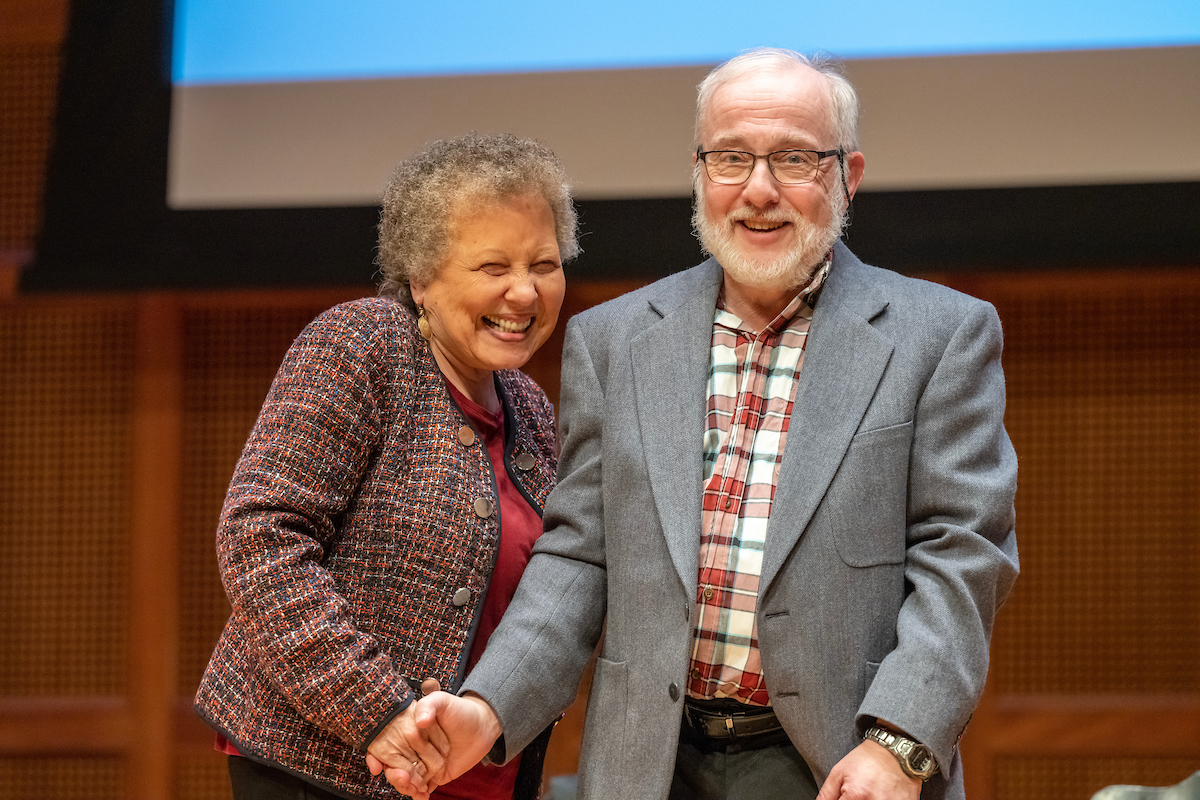F&M Stories
Socrates Citation in Honor of Alan Levine
Professor Alan Levine’s creativity and curricular innovation are evident in the titles of his courses — “Slice of Pi,” “Math and Sports,” “Sound, Music and Science,” and “Irresistible Integrals and Seductive Series” — so it is no surprise that he has been the driving force behind several important curricular developments. In the early 1990s, Professor Levine co-authored “Discovering Calculus” with George Rosenstein. Its adoption put F&M at the forefront of the Calculus Reform movement. He also played a significant role in the department’s decision to introduce theoretical mathematics in the sophomore year — by teaching several iterations of the course and writing "Discovering Higher Mathematics: Four Habits of Highly Effective Mathematicians," one of the first such books of its genre. Professor Levine pushed to restructure the way probability and statistics are taught, opening up the sequence to more students. He was instrumental in proposing the applied math minor. Professor Levine developed and taught the full slate of courses, which was integral to the minor's early success and laid the foundation for currently graduating over 30 students each year.
Professor Levine’s substantive contributions to the curriculum throughout his 40-year career derive from his wholehearted dedication to students. Thousands and thousands of students have taken the far-ranging courses he has offered. A few dozen have benefited from his supervision of a wide variety of independent studies and directed readings. Students appreciate Professor Levine’s thorough class preparation. They praise his well-organized notes. They value the time he devotes to office hours. They tolerate his jokes. (Some even enjoy them.) Students know that Professor Levine, the only-ever occupant of Stager 208, always keeps his door open for help with homework in any class but Topology, for advice about actuarial exams, for calculus placement questions, and for commiseration about the Mets.
Professor Levine developed a reputation in the mathematical community for applying math modeling to sports. He is known more recently for translating a seminal monograph by famed Russian mathematician Andrey Markov.
When Professor Levine refers to himself as the “eighth dwarf, Cranky,” he belies a generosity that extends far beyond his open office door. He freely shares his extra-mathematical talents, musical and otherwise. A devoted member of the F&M College Chorus, he is also widely beloved (if not a little feared) for his role as pianist in the Fum Follies parodies of life at F&M. Drawing on his expertise in genealogical research, Professor Levine provided the department with a history of the Ronald K. Stuart Prize, which has been awarded to the top math student(s) each year since 1962, as well as information about each of the 82 prize winners. His woodworking skills have furnished the department with tables, display cases, and a treasured plaque that honors a departed colleague.
These are but a few ways that Professor Levine has left his mark since arriving in 1983 with a Ph.D. in Applied Mathematics from Stony Brook University. His attention to the curriculum has been his most significant contribution and the department's offerings are stronger because of his influence; His colleagues and students have benefited greatly from his generous spirit and multiple talents.

Related Articles
March 5, 2026
F&M Poll: Voters Overwhelmingly Support Democratic Principles
Voters don't approve of the tactics of the Immigration and Customs Enforcement agents (ICE) and oppose nationalizing the elections, according to the latest Franklin & Marshall College Poll shows.
March 4, 2026
A Peek Behind the Stacks: A Student’s Role in the College Library
Learning by doing is a hallmark of the Diplomat experience. For Abby Jones ’28, this philosophy comes to life at the College Library in a role that blends her love of reading, writing, and stories. “I’ve always loved libraries, and was excited to step into a job where I’d get to work with a lot of the books in a more hands-on way,” she said.
March 2, 2026
[Video] Thinkers, Doers, Diplomats: Maj. Gen. Richard P. Mills ’72 on the Spirit of Service
For Maj. Gen. Richard P. Mills ’72, an F&M education was the launchpad for a storied military career and a lifelong journey of discovery. As he watches today’s Diplomats walking the same paths he once did, Mills sees a familiar pilgrimage toward a future of influential leadership and engaged citizenship.
